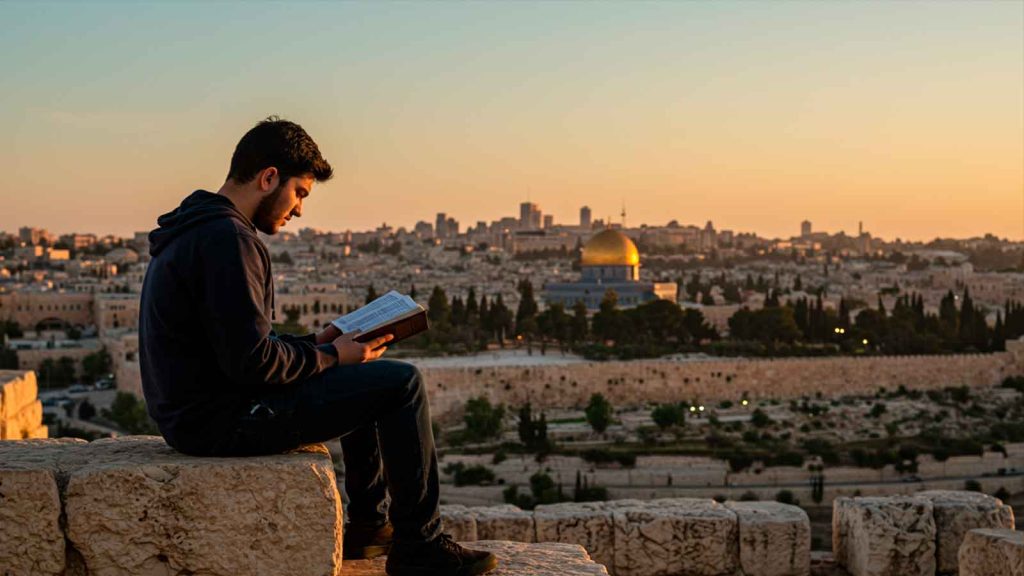Psalm 132 is one of the deepest pilgrimage songs and holds a place of honor among the royal psalms. It revives an ancient covenant, recalls David’s faithfulness, and points to the fulfillment of divine promises. This psalm invites meditation on themes such as covenant, devotion, divine presence, and righteous leadership.
Throughout this article, we will explore Psalm 132 from several angles, examining its historical context, poetic structure, spiritual meanings, and lessons for everyday life. A careful reading shows how the spiritual memory of a people can become a renewed source of hope.
Complete Psalm 132
¹ Lord, remember David, and all his afflictions.
² How he swore unto the Lord, and vowed to the Mighty One of Jacob, saying:
³ Surely I will not enter the tent of my house, nor go up to my bed;
⁴ I will not give sleep to my eyes, nor slumber to my eyelids,
⁵ Until I find a place for the Lord, a dwelling for the Mighty One of Jacob.
⁶ Behold, we heard of it in Ephrathah; we found it in the fields of the forest.
⁷ We will go into His tabernacles; we will worship at His footstool.
⁸ Arise, O Lord, to Your resting place, You and the ark of Your strength.
⁹ Let Your priests be clothed with righteousness, and let Your saints shout for joy.
¹⁰ For the sake of David Your servant, do not turn away the face of Your anointed.
¹¹ The Lord swore truth unto David and will not turn from it: “Of the fruit of your body I will set upon your throne.”
¹² If your children keep My covenant and My testimonies that I shall teach them, their children also shall sit upon your throne forevermore.
¹³ For the Lord has chosen Zion; He has desired it for His dwelling, saying:
¹⁴ “This is My resting place forever; here I will dwell, for I have desired it.
¹⁵ I will abundantly bless her provision; I will satisfy her poor with bread.”
¹⁶ “I will clothe her priests with salvation, and her saints shall shout aloud for joy.
¹⁷ There I will make the horn of David grow; I have prepared a lamp for My anointed.
¹⁸ I will clothe his enemies with shame, but on him his crown shall flourish.”

Explanation of Psalm 132
Psalm 132:1
Lord, remember David, and all his afflictions.
The psalmist begins by asking God to remember David’s struggles and zeal—especially his dedication to preparing a worthy place for the ark of the Lord. The plea is filled with reverence and intercession, requesting that David’s hardships be seen as proof of his faithfulness and love for the divine presence.
Psalm 132:2
How he swore unto the Lord, and vowed to the Mighty One of Jacob, saying:
This verse introduces David’s solemn vow. He did more than wish; he made a commitment. Mentioning the “God of Jacob” underscores the historic and relational nature of the covenant, linking the present to the patriarchal line and highlighting the importance of the promise driving the psalm.
Psalm 132:3
Surely I will not enter the tent of my house, nor go up to my bed,
David declares that he will not allow himself personal rest until he fulfills what he promised God. His dedication is so extreme that he gives up household comfort and sleep to put the Lord first. This shows how central God’s presence was in the king’s life.
Psalm 132:4
I will not give sleep to my eyes, nor slumber to my eyelids,
The repetition and poetic language emphasize the urgency and intensity of David’s mission. He is determined not to be distracted or delay his goal. The verse highlights a practical, committed spirituality that places God above personal well-being.
Psalm 132:5
Until I find a place for the Lord, a dwelling for the Mighty One of Jacob.
David’s goal is to find a suitable location for the ark of the covenant, representing God’s presence among the people. He aims to build not merely a physical structure but a consecrated space. The verse conveys zeal, honor, and a sense of spiritual responsibility.
Psalm 132:6
Behold, we heard of it in Ephrathah; we found it in the fields of the forest.
The ark of the covenant—once forgotten or hidden—was rediscovered. “Ephrathah” and “fields of the forest” point to symbolic locations in Israel’s history. The verse links oral tradition with the spiritual reality of rediscovering God’s presence among the people.
Psalm 132:7
We will go into His tabernacles; we will worship at His footstool.
Here the people position themselves in worship. The “footstool” symbolizes humility and total reverence before God. His presence is not merely celebrated but honored with a posture of submission and sincere devotion.
Psalm 132:8
Arise, O Lord, to Your resting place, You and the ark of Your strength.
This is a plea for God to assume His place of honor among the people. “Resting place” does not mean inactivity but an established presence. The “ark of Your strength” shows that divine power is tied to God’s dwelling in Zion.
Psalm 132:9
Let Your priests be clothed with righteousness, and let Your saints shout for joy.
Righteousness is presented as the priests’ garment, showing that God’s presence requires purity and integrity. The saints’ joy results from the divine dwelling. The verse unites holiness and celebration as fruits of a living covenant.
Psalm 132:10
For the sake of David Your servant, do not turn away the face of Your anointed.
The psalmist appeals to the covenant with David for mercy. “Your anointed” likely refers to a successor king. The request is that God continue to look with favor on David’s line, maintaining His faithfulness to the promises made.
Psalm 132:11
The Lord swore truth unto David and will not turn from it: “Of the fruit of your body I will set upon your throne.”
This is the heart of the covenant: God firmly promised David that his offspring would rule. The language is direct, leaving no room for doubt. The verse reinforces trust in God’s unchanging character.
Psalm 132:12
If your children keep My covenant and My testimonies that I shall teach them, their children also shall sit upon your throne forevermore.
The promise involves a condition: obedience. The covenant is lasting but requires the descendants’ faithfulness. The blessing of the royal line is linked to observing God’s will, balancing grace and responsibility.
Psalm 132:13
For the Lord has chosen Zion; He has desired it for His dwelling, saying:
Zion is presented as the chosen city. This is not by chance or human preference but by divine decision. The verse establishes Jerusalem as a spiritual center by the Lord’s sovereign will.
Psalm 132:14
“This is My resting place forever; here I will dwell, for I have desired it.”
God states His intention to remain in Zion. “Forever” indicates continuity and stability. The divine desire turns that place into a permanent reference of presence, protection, and communion.
Psalm 132:15
“I will abundantly bless her provision; I will satisfy her poor with bread.”
God’s presence results in provision. The verse reveals the practical side of blessing: food, abundance, and social justice. God cares for both the spirit and the bodily needs of His people.
Psalm 132:16
“I will clothe her priests with salvation, and her saints shall shout aloud for joy.”
Salvation is like a garment covering the priests. The spiritual atmosphere is one of restoration and deep joy. The saints’ celebration expresses the fullness of life in God’s presence, filled with light and rejoicing.
Psalm 132:17
“There I will make the horn of David grow; I have prepared a lamp for My anointed.”
Zion will be the stage for the rebirth of the royal line. The “lamp” symbolizes hope, continuity, and guidance. This verse carries a strong messianic tone, pointing to the eternal reign of David’s descendant.
Psalm 132:18
“I will clothe his enemies with shame, but on him his crown shall flourish.”
God guarantees the victory of His anointed. The enemies will be humiliated, while the chosen one’s royalty will blossom. The contrast between shame and glory closes the psalm by reaffirming God’s commitment to justice and the promise made to David.

Context of Psalm 132
Psalm 132 is classified as a pilgrimage song, meaning it was sung by pilgrims on their way to Jerusalem. It recalls two major moments in Israel’s history: David’s zeal in seeking a permanent dwelling for the ark of the covenant and God’s response confirming His covenant with David and promising to establish his throne forever.
This psalm is one of the longest in the pilgrimage series and is characterized by a structure that blends supplication, historical memory, and prophetic promise.
Structure of Psalm 132
We can divide Psalm 132 into three main parts, each rich in theological and poetic meaning.
Remembrance of David’s Devotion
The opening verses describe David’s solemn vow not to rest until he found a place for the Lord to dwell. This act of extreme dedication shows the king’s heart fixed on God’s presence, placing Him above personal comfort.
Cry for God’s Presence
Next, the psalmist cries out for God to dwell again in Zion, which became a symbol of the covenant. The plea involves both the people and the priests, asking for restoration, righteousness, and joy.
Confirmation of the Divine Promise
The final part of Psalm 132 brings God’s response: He has chosen Zion and promises to bless the people, provide sustenance, grant justice, and sustain David’s lineage. It powerfully points to covenant continuity amid historical challenges.
Spiritual Meanings of Psalm 132
Psalm 132 communicates profound truths applicable to many life moments. Below are some important reflections.
Zeal for God’s Presence
David’s example shows that nothing was more valuable than God dwelling among His people. This priority challenges readers to consider what occupies the center of their own lives.
God’s Historical Faithfulness
By remembering the promises made to David, the psalm confirms trust in a God who keeps His word. This historical faithfulness sustains the people’s faith and renews hope in adversity.
Zion as a Covenant Symbol
God’s choice of Zion represents more than a physical place. It symbolizes communion between God and humanity. The psalm reinforces that true security lies where God chooses to dwell.
Practical Applications of Psalm 132
Beyond its poetic beauty and liturgical importance, Psalm 132 teaches lessons for anyone seeking to live with purpose and faith.
Prioritize the Kingdom of God
David sought a place for the ark before building his own house. This reveals surrender and commitment—an example of a life with the right priorities.
Perseverance in the Covenant
Despite human instability, the psalm reminds us that God’s covenant stands firm. Trusting His promises requires faith and daily remembrance of revealed truths.
Value the Community
The prayer includes not only the king but also priests and worshipers. God’s blessing involves the collective, not just the individual. Authentic spirituality manifests in fellowship.

Psalm 132 and the Songs of Ascents
Among the Songs of Ascents, Psalm 132 stands out for its royal and prophetic character. It contrasts with more personal or contemplative psalms by addressing institutional and community themes.
This psalm also connects with other Davidic psalms, forming a continuous line that reinforces David’s role as a messianic symbol.
Relationship with Psalm 89
Both psalms highlight the covenant with David and speak of an eternal throne. However, Psalm 89 laments an apparent break in the promise, while Psalm 132 reaffirms divine faithfulness.
Complementarity with Psalm 122
Psalm 122 celebrates the joy of going to Jerusalem, and Psalm 132 explains the reason for that joy: the Lord’s presence in His chosen place.
Questions for Meditation on Psalm 132
Psalm 132 offers more than a historical reminder of David’s covenant; it prompts readers to review their spiritual journey. As you dive into this text, consider the following questions for deeper, transformative meditation.
Am I truly placing God at the center of my decisions?
David prioritized God’s presence before seeking personal comfort. This example challenges us to reevaluate our choices and priorities. Do our decisions reflect a desire to please God or merely personal interests?
How can David’s faithfulness inspire my walk today?
Despite challenges and uncertainties, David kept his commitment to the Lord. His persistence in building a dwelling for God shows an active faith. In which areas of life have we failed to remain consistent?
What divine promises have I seen renewed in my life?
The psalm speaks of eternal promises that continue through generations. Looking back and identifying moments when God renewed His promises strengthens faith and generates gratitude.
How much space does God’s presence occupy in my routine?
God’s dwelling in Zion was a cause for celebration and reverence. Today, the divine presence also seeks constancy in our daily lives. Is it pursued intentionally or relegated to second place?
Is my community a reflection of a place where God dwells?
The psalm values the collective: priests, believers, city. How have we contributed to making our churches, homes, and social environments marked by justice, joy, and the living presence of the Lord?
Reflecting on these questions in light of Psalm 132 turns reading into an invitation to spiritual realignment, sincere worship, and renewed commitment to God.
Conclusion
Psalm 132 is more than a historical reminder. It is a song that points to God’s faithfulness despite human instability. Its content encourages us to trust eternal promises and to live so that the divine presence becomes our highest priority.
FAQ
Was Psalm 132 written by David?
There is no direct indication of that, but it centers on David and his covenant with God.
What is the main theme of Psalm 132?
God’s faithfulness to the covenant with David and His presence in Zion.
What is the ark of the covenant mentioned in Psalm 132?
It was the visible symbol of God’s presence among the people of Israel.
Is Psalm 132 still relevant today?
Yes. It invites us to prioritize God’s presence and trust His promises.
What links Psalm 132 to Jesus?
Christ, a descendant of David, fulfills the promise of an eternal throne.
READ ALSO:
- Psalm 118: Praise for God’s Faithfulness and Victory
- Psalm 117: Universal Praise for God’s Faithfulness
- Psalm 116: Gratitude that Transforms Life
- Psalm 115: An Invitation to Trust in God
FOLLOW US ON FACEBOOK
I hope you enjoyed it.